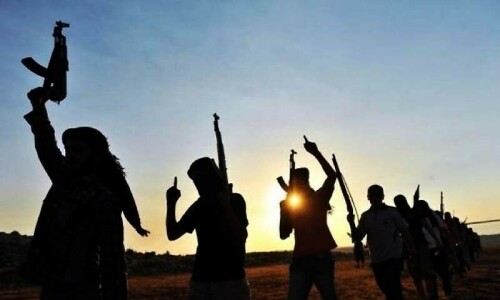FAILED state, surging economy, most risky place: what really is Pakistan? I tackled this riddle by comparing Pakistan globally and regionally on 25 critical progress measures across four dimensions.
I took the world governance, democracy, press freedom and corruption indices for governance, and the human development, happy planet (HPI) and slavery indexes and child and maternal mortality, literacy, life span and poverty indicators for social progress. For economics, I took the doing business and economic freedom indexes; the tax, debt, export, industry, foreign investment and current deficit ratios to GDP; and GDP growth, inflation and per capita income. For security, I took the fragile states and global peace indexes. To ensure rigour, I excluded some key measures (eg, investment) where global databases had gaps or did not cover 150+ (75pc+ of total) countries.
‘Patriotic’ Pakistanis must exercise caution in reading further since results may hurt their delicate egos. Even my Pakistani ego was bruised badly though I wore my academic hat. All figures below show the percentage of surveyed countries ranked better than that country on the measure. On average, 73pc of countries beat us overall, and 76pc on governance, 69pc on social, 71pc on economic and 94pc on security measures. Our best rankings (below 50pc) are on the HPI (14pc), GDP growth (34pc), current deficit (40pc) and poverty (43pc). The next best ranking is 65pc on the democracy index. Our worst rankings (all 85pc+) are on slavery, press, fragile states and peace indexes and child mortality, export-GDP and tax-GDP rates.
Regionally, I excluded ultra-tiny Maldives and Bhutan, they being absent from many databases. But they do top regionally on income. Sri Lanka (52pc), on average overall, ranks first, followed by India (63pc), Bangladesh (64pc), and Nepal (67pc). Pakistan (73pc) only beats Afghanistan (78pc)! Texans say ‘Thank God for Mississippi’, since only it lags behind Texas on social measures. We too must thank Afghanistan for joining Saarc and saving us the blushes of coming last.
The research here may upset ‘patriotic’ Pakistanis.
Except Sri Lanka, South Asia states overall outperform Africa only. Miffed by tiny Sri Lanka’s lead, some Indians and Pakistanis argue that small states are easier to govern and develop. But by this logic, we must divide India and Pakistan into many small states. This ‘treasonous’ idea quickly makes people accept that large size helps too.
We rank fifth regionally on governance, security and social progress but embarrassingly last economically. If this last bit irks Messrs Sharif and Dar, let me add that global data is usually two to three years old and may not reflect their recent economic ‘miracles’. Also, Afghanistan beats us economically only given its abnormally low debt-GDP ratio achieved due to huge American aid. We beat it on the 10 other economic measures.
Also, if an economic development index is ever invented, measuring national ability to produce high-end goods, services and labour, we would rank behind India only regionally and among the top six to seven among 40+ non-oil Muslim states. Our best regional ranks (second) are on the HPI, poverty rates and the dubious economic freedom index.
My research may upset ‘patriotic’ Pakistanis. But do not blame the messenger for the bad news. Let me say we are now recovering from our worst phase ever and rankings may improve a bit soon. But one must avoid knee-jerk reactions like hunting selectively for obscure indicators where we beat India.
My Berkeley training disallowed me this trick. Instead, I first took the most critical measures and then made comparisons rather than vice versa. Also, our ranking is poor on too many measures to blame methodologies or invoke conspiracies against the world’s only (self-styled) ‘Islamic fortress’. Many blame things on the corruption and mal-governance of elected leaders. But our scores on the corruption and world governance indexes have improved after Musharraf. Regional ranks confirm democracy’s edge too. The two consistent democracies lead, with the three patchy democracies in between and Afghanistan last.
Luckily, we do better on several ‘potential’ and ‘significance’ measures. We have the fifth largest population, sixth biggest army and nuclear arsenal and 18th-biggest middle class and are among the biggest exporters of skilled labour. We lag behind only 30pc of countries on the index of national power, being near the top among developing ones.
We must convert this potential into better outcomes. The best strategy is investing massively in our large but deprived population to increase people’s incomes and purchasing powers, hence expanding domestic demand, production, jobs and again people’s incomes under a continuous virtuous circle. Making the rich richer first makes the poor richer too, neo-liberalists say. But making the poor richer first will make the rich richer too. Thus, poverty reduction is not only a welfare strategy to help the poor as in Bisp, but can also be a creative national development strategy.
The writer is a political economist.
Published in Dawn, December 6th, 2015













































